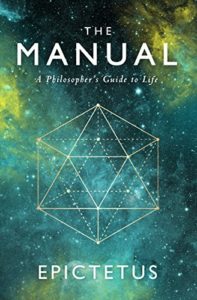For most of my life, I had no interest in studying philosophy. Studying philosophy evoked images of college professors wearing corduroy jackets with elbow patches, smoking pipes, sitting around contemplating the meaning of life. The subject felt way too theoretical for me. I was always interested in the subjects of math and science where you were presented with problems and challenged to find the answers.
My attitude toward philosophy changed two years ago when I was encouraged to read The Daily Stoic by Ryan Holliday and Stephen Hanselman. Seeing how the writings of philosophers who lived 2,000 years ago were just as applicable today fascinated me. I learned a lot exploring each of the daily readings and was interested in learning more about Stoicism.
My interest has led me to start exploring more direct interpretations of the ancient philosophical writings of Marcus Aurelius, Epictetus, Seneca, and others. One of my first explorations was The Manual: A Philosopher’s Guide to Life, originally written by Epictetus. I read a translation that was compiled by Sam Torode, who also wrote a modern translation of the James Allen classic As a Man Thinketh.
For many stoicism has connotations associated with lack of emotion. Sam Torode does a good job in the introduction to the work explaining the essence of the philosophy. As he summarizes, “Stoicism doesn’t mean repressing emotion and shunning pleasure, but focusing on what is in our power and letting go of everything we can’t control.” The second half of his summary statement is so powerful when you are able to internalize it. That’s what drew me into Stoicism and made we want to explore it further.
Torode translates Epictetus’ work into 53 short essays or maxims. On average each one is less than half of a page, but they pack powerful insights. Here are just a few from the book:
If you wish to have peace and contentment, release your attachment to all things outside your control. This is the path to freedom and happiness. (from #1)
People who are ignorant of philosophy blame others for their own misfortunes. Those who are beginning to learn philosophy blame themselves. Those who have mastered philosophy blame no one. (from #5)
Think of life as a play, and yourself as an actor. Your role and time on stage is up to the Author’s choosing. Whether you are cast as a pauper, a cripple, a congressman, or a king, play your part to the best of your ability. (from #17)
Continually remind yourself that you are a mortal being, and someday you will die. This will inspire you not to waste precious time in fruitless activities, like stewing over grievances and striving after possessions. (from #21)
Find satisfaction in following your philosophy. If you want to be respected, start by respecting yourself. (from #23)
No one can steal your peace of mind unless you let them. (from #30)
Be the same person in public as in private. (from #33)
A person’s worth, after all, is not found in possessions or style. (from #44)
Do not proclaim yourself a philosopher, or go around preaching your principles. Show them by example. (from #46)
Philosophy is for living, not just learning. (from #52)
The Manual is a good book regardless if you are interested in studying Stoic philosophy. There are so many good insights in it on how to live a fuller, more complete life. However, I’m not sure that I would recommend it as your first dive into Stoicism. It helps to have some background by reading other books before jumping in. The Daily Stoic, for example, would be a great starting point. Then the readings in The Manual will make more sense and help to build your knowledge and practice of the philosophy.
On the other hand, if you’ve already read, or are reading, The Daily Stoic or other Ryan Holiday books such as Ego Is the Enemy or Stillness Is the Key, and want to go deeper into Stoicism, then I would highly recommend it.

